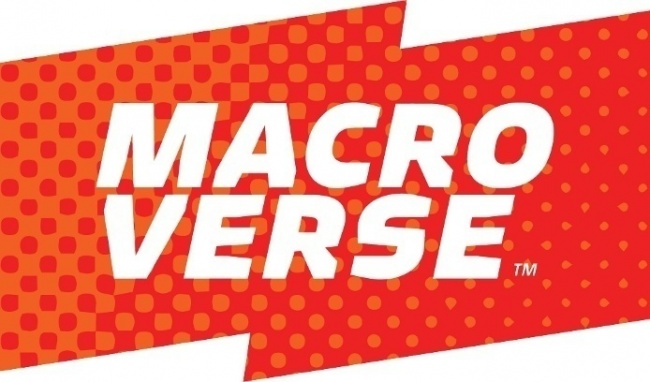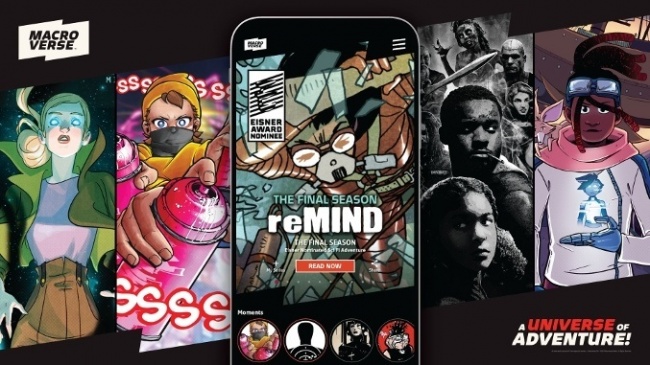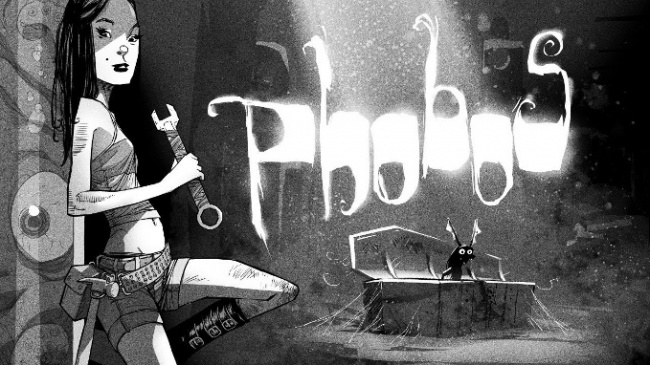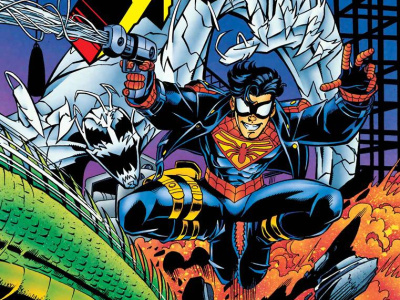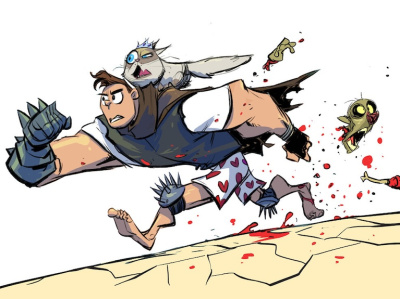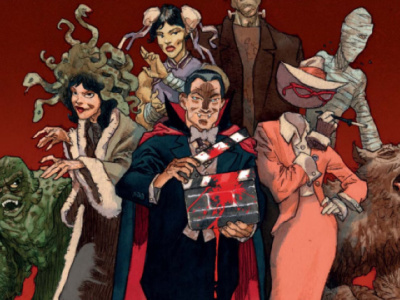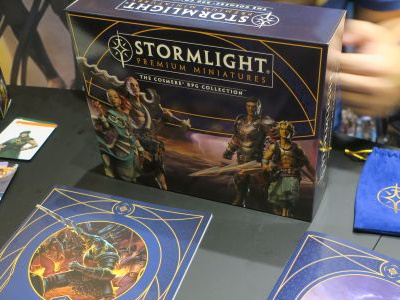The North American digital comics landscape has continued to evolve since the acquisition of comiXology by Amazon in 2014 (see "Amazon Acquiring comiXology"), with the expansion of comics content on the Amazon platforms, and the growth of the webtoon format via Webtoon (see "Webtoon Running Multi-Million Dollar Ad Campaign") and Tapas. Last October, the Macroverse platform launched for iOS and Android, with a combination of content adapted from other formats and original content by established and new creators.
Content is offered on an all-you-can-read subscription model at $4.99 per month or $49.99 per year.
Early development has been funded by the founders, but the company is currently raising an angel round of $500,000, of which $250,000 has been committed, with plans for a formal seed round early next year.
Macroverse currently offers around 200 "episodes" from over 30 series (an episode is roughly a two- to five-minute reading experience, a third to a half of a traditional comic story). Today the company is adding Phobos, a new series by Jason Brubaker, whose comic reMIND, on Macroverse, received an Eisner nomination this year (see "2020 Eisner Award Nominees Announced").
We talked to Macroverse Co-Founder Eben Matthews about the platform and the new content.
ICv2: You've said you were looking for a way to present comics content in a way that's appropriate for mobile. How has your format accomplished that?
Eben Matthews: We have developed what we call our Tap Story format. If you're thinking about a traditional comic space, instead of going from panel one, to panel two, to panel three, we've introduced the element of time into the storytelling.
What that means is that, instead of panning across the page or taking an existing page and trying to reformat it for a phone screen, we've rethought how we're moving through the story, and it's through a series of taps. Every time we tap the screen, something changes. What that allows us to do creatively is think about time as an element within the storytelling.
If you go from point A to point B over the course of 3 taps, that's going to be a radically different storytelling experience than if you take 30 taps to get from point A to point B. I mean this in the most complimentary way.
If you want to do Bendis-style dialogue, we can do that without putting 50 balloons on a page, so you can think about how you're pacing things in different ways. You can think about how you're moving a story along in different ways.
It's fundamentally rethinking what we consider the core of what the art form of comics is, which I would define as the juxtaposition of images and text, but rethinking how we're presenting it in a way that really feels crafted for a smaller screen, for a vertical orientation, and again, for this thing that we've all become addicted to in our pocket. It creates a more cinematic experience while still we believe staying true to the art form.
What's the business model?
Our business model is a little bit unique in the industry. We are a subscription service. We like to talk about it as, we're the HBO of comics, or especially the HBO of digital comics. We're not an open platform in the way that WEBTOONs or Tapas, or some of these other things are. We do have a pretty high-quality bar as far as the stuff that we're bringing onto the platform. We are a subscription service. That creates a premium tier to everything as well.
The way we work with creators is that the revenue that comes in through the subscribers, a portion of that gets taken to grow and build the company, and then a portion of it, roughly 50‑50, goes into our creator pool, and then that gets divided by readership.
One thing I think is cool is that we have access to data in a way that other platforms or publishers may not be willing to share.
We do like to share that with our creators so we can show them and work with them on a monthly basis to say, "OK, we did this this month, and here's the portion of the revenue that was generated as a result of that, and now, what do we do next month to grow that audience and grow that engagement and make that bigger?"
Over time, it's an all boats rise together mentality, where we can create a lot of different entry points through these different series and with these different creators, and then go off this platform together where everyone is getting a very democratized, very transparent piece of all the revenue that's generated.
Is the content oriented toward a particular audience?
The sweet spot for us is definitely in the 18‑to‑35‑year‑old comics reader, or someone that likes to read or consume content through a device.
As far as genre and style or type of content, one of the things we love is that we're not looking for a particular thing, or trying to promote one type of thing over another, so we've got a very wide mix, an eclectic mix of genres, and style, and specific ways of approaching these different stories.
Some of them feel very underground and remind me of going to the comic store in the 90s and never knowing what I was going to discover, whether it was Ninja Turtles or Maus.
There are other things which feel very mainstream, feel very much like they would be able to sit side‑by‑side with anything from Image, or BOOM!, or any of the premier publishers that are doing independent creative work.
That's the one thing I love about it is, we get to see and work with this very wide range of creators and the stories that they want to tell.
The gender mix is about 50‑50.
Is all the material original to the app, or is some of it adapted from other places?
It's a combination of the two, so we do have stuff that's exclusively original for the app. There's certainly a section of material that's been adapted either from existing print material, or from Web comics, or other places. I do want to stress that the stuff that we adapt, we are taking a completely fresh look at.
I'll give one example. There's a series which has done very well over the past couple of months called Gun Candy, which is a 12‑Gauge title, illustrated by Brian Stelfreeze, who people would know from Black Panther and many, many other series.
Being able to take that and re‑imagine it for the app, it's not a one‑to‑one translation. It's really a creator's cut, as we call it, where we're working with creators. In some cases, we're changing dialogue. In some cases, we're reworking pieces of art, or we're rethinking how we're moving through these scenes to really take advantage of the format.
Even if something has existed somewhere else, it’s a fresh experience of it.
We don't feel like we're even competitive with traditional comics. We think these things can live in our format and in print very comfortably, and there's a whole other subset of our creators where that's part of the plan.
We really embrace that, where many of the new series that we have coming on will launch on Macroverse as exclusive content for us, and then they'll either build to a print release, or to Kickstarter for a print release, or some combination of the two, so that people that want the physical tangible object can certainly still have that, have the wonderful experience of a beautiful book.
At the same time, you get this very immediate satisfaction and this different cinematic experience through the device.
It looks like PHOBOS, which is launching on Macroverse today, is one of the titles with both a Macroverse and a physical edition planned. We saw an Indiegogo campaign running now and it looks like there’s a physical edition planned for next year?
That's correct. PHOBOS is Jason Brubaker's next project, and so we've been working hand‑in‑hand with them to develop the material for the app: at the same time, they've been creating it for the hard covers.
His approach is that everything is designed for this beautiful collectible hardcover edition, and so we become the exclusive digital home for all of his content, and so you've got both sides of that equation where you again get the immediate feel of being able to access his stories.
The new series will be exclusive to us for the rest of this year, and then when the hardcover is released early next year, you'll have the option of having both of those experiences with his stories.
How will you compete with established, and in some cases, gigantic competitors?
We're certainly aware of comiXology and the other players in the market, and we have a tremendous amount of respect for what they've built. In fact, I think comiXology has really proven that there's an appetite for people to consume things on these devices.
If you look at something like WEBTOONs, it really proves the size of the audience for mobile consumption of this type of content.
The way we look at it is that we can position ourselves as a piece of the ecosystem as opposed to necessarily trying to disrupt or take over from the incumbents. I think we're just offering a different value proposition for creators specifically who want to own and control and really have a different way of monetizing and engaging with their audience.
We look at it as we're not saying it's us or them. We're saying it's us and them. The more you can synergize these things together, especially from an independent creators point of view, the more ways there are to monetize your content build an audience, develop things develop things into other media, and really take key things and turn them into bigger franchises over time.
Is that the case now, where some of the series on Macroverse are also on comiXology?
Yeah, absolutely.
Anything else you want our readers to know about your company?
We think we've cracked the code on a different way of approaching this stuff. We hope people will check out the app and give it a try. We have a seven‑day free trial, and we certainly encourage people to take advantage of that. Jump in, read as much as you want, and we hope you'll find value in it and stick around, but we really just want people to discover this stuff and see the creators and the series that we fall in love with. We hope that other people will fall in love with it as well.
We love being a part of everything that's happening as we're moving into this next phase that the comics industry is facing, and can hopefully be a part of really helping people find great content, support creators in what they want to do, and build a platform that does exist within the ecosystem of the industry in a beneficial way.
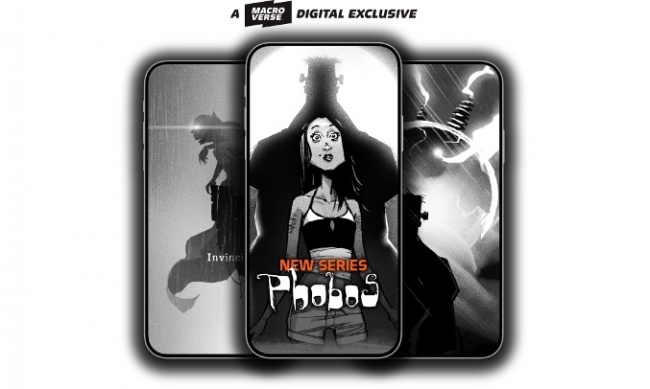
We Talk to Co-Founder Eben Matthews
Posted by Milton Griepp on October 6, 2020 @ 8:22 am CT
MORE COMICS
Part of 1996 Marvel/DC Crossover
August 1, 2025
Writer Karl Kesel and artist Mike Wieringo are the creative team for the one-shot comic, which was first published in 1996 in the middle of a Marvel/DC crossover.
Crowdfunding Campaign Launches in October, Followed by Retail Release
August 1, 2025
Vault will crowdfund the graphic novel on the Backerkit platform in October, then release it to retail.
MORE NEWS
In 'Dracula vs. Hitler'; New RPG Just Unveiled by Devir Games
August 1, 2025
Devir Games unveiled Dracula vs. Hitler , a new RPG, that will be heading to BackerKit.
For 'Cosmere RPG'
August 1, 2025
Brotherwise Games previewed their Stormlight Premium Miniatures Collection , for Cosmere RPG .



